Thinking of starting a flourishing, fragrant herb garden at home but haven’t had much luck in the past? Choosing the right companion planting herbs is the secret to success in a small garden or raised garden bed!
Growing certain herbs together can promote the health and growth of your garden, keeping pests at bay, attracting pollinators, and even enhancing the flavour of neighbouring fruits, veggies, flowers and herbs.
A huge range of combinations is available to see success in your herb garden. Here, we share our complete guide to companion planting herbs!
Basil companion plants
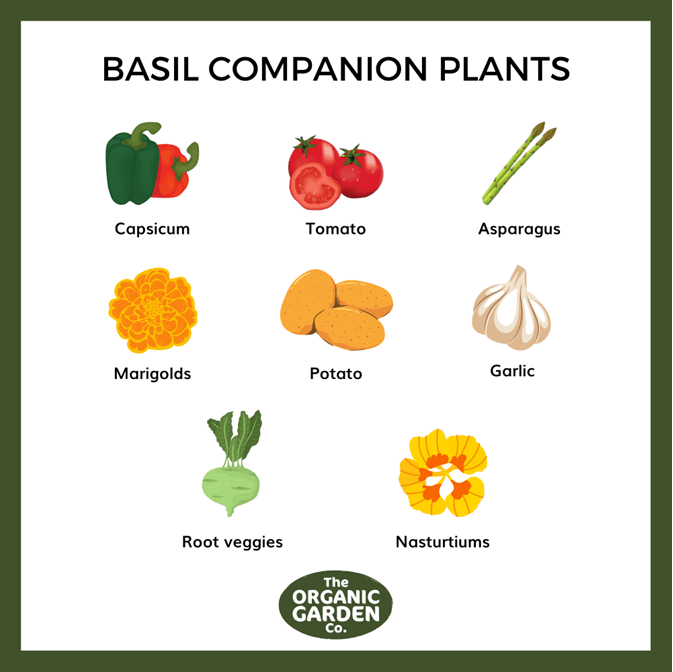
There are many basil companion plants and combinations, all with different benefits that can help basil grow and thrive.
- Capsicums love sunlight, just like basil. Basil also deters spider mites, mosquitos and flies and provides shade over the capsicum leaves to protect the crops from the weather.
- Tomato and basil are a classic combination because they love the sun and well-draining soil. Basil also protects tomatoes against pests like aphids, thrips, and tomato hornworms.
- Asparagus attracts beneficial insects like ladybugs, the natural predator of pests like aphids. In the same vein, basil repels the asparagus beetle, which can damage the asparagus’ newly sprouted tips.
- Marigolds are ideal for repelling pests like nematodes, aphids, beetles and slugs while attracting beneficial insects like ladybugs, hoverflies and wasps that control pests in the garden.
- Potatoes attract beneficial insects like butterflies and bees that help pollinate the crops. Plus, basil encourages a healthy, plentiful potato harvest.
- Garlic and basil complement each other’s flavour when grown together, but it’s important to space them out in the garden bed, so they both have enough room to grow. Garlic can also repel pests like aphids, spider mites and whiteflies.
- Root vegetables like carrots and beets can gain extra flavour from basil. Plus, the scent of basil can deter soil-boring insects attracted to root vegetables' leaves.
- Nasturtiums are a trap crop for basil, luring aphids and other pests away. Plus, nasturtiums are also a beautiful addition to any garden, and their flowers are edible!
Plants to avoid
While many herbs grow well together with basil, there are also herbs and plants that you should avoid at all costs! These include basil, cucumbers, sage, thyme, common rue and fennel.
- Cucumbers tend to compete with basil for resources like water and nutrients, stunting the growth of your basil plant.
- Thyme and sage have different growing requirements than basil. Thyme needs drier, sandier soil, and basil needs moist, nutrient-rich soil.
- Fennel and common rue attract pests that could infect your basil plant and stunt its growth. Plus, common rue can also make basil leaves taste bitter.
Parsley companion plants
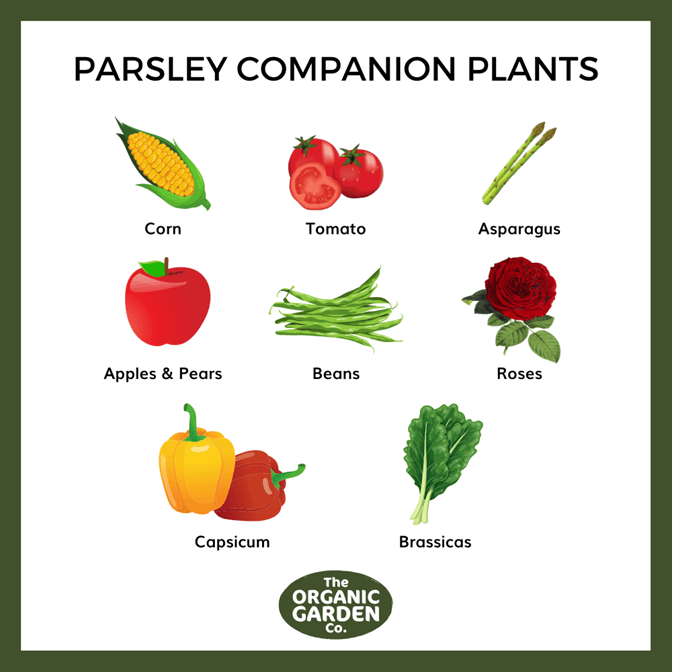
Parsley flourishes when it flowers, which can be beneficial to a wide variety of parsley companion plants!
- Corn is vulnerable to many pests, including earworms and cutworms. Flowering parsley will attract wasps that will hunt down and kill these pests, allowing your corn to flourish.
- Tomatoes, like corn, can be protected by parsley. Your parsley plant can lure aphids away from your tomatoes and attract hoverflies that feed on aphids.
- Asparagus and parsley encourage each other’s growth. Plus, parsley can draw away the asparagus beetle.
- Apple and pear trees attract various breeds of moths that feed on the leaves. Parsley attracts these moths, so your apple and pear trees have a chance to grow.
- Beans are vulnerable to cutworms, the natural prey of the tachinid fly. Luckily, these flies are attracted to parsley!
- Roses attract sawflies, but parsley attracts hoverflies which attack the rose-eating flies. Plus, parsley can also repel rose beetles.
- Capsicum is vulnerable to many pests like corn earworms, aphids, beetles and more, but parsley can easily combat this!
- Brassicas like cabbage, cauliflower, kale and broccoli are often damaged by cabbage worms and cutworms. Parsley attracts beneficial insects that eat these worms.
Plants to avoid
There are a few plants that don’t pair well with parsley, including plants in the allium family, like garlic, onions and shallots. Alliums tend to stunt the growth of parsley!
- Lettuce doesn’t pair well with parsley, either. Parsley can cause lettuce to go to seed too early in the growing season.
- Mint has spreading roots that can easily overwhelm other plants. If you’re planning to grow mint, plant it in an isolated area away from other aromatic herbs like parsley.
- Carrots and parsley are in the same family, meaning they can cross-pollinate. They can attract carrot root flies and cause issues with seed-saving.
Mint companion plants
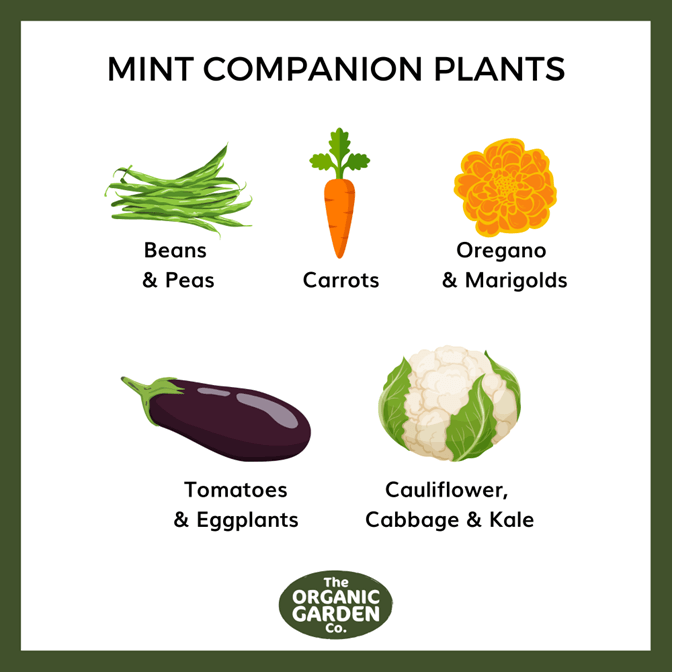
Mint is typically a very happy plant, enjoying both full sun and shady areas. They’re easy to grow, and many mint companion plants can fill your garden with colour and mouth-watering scents.
- Beans and peas appeal to larger pests like rats and mice, but planting mint can deter them from snacking on your veggies.
- Carrots are vulnerable to carrot flies that lay eggs around the roots. Once hatched, the larvae burrow into the developing carrots. Mint naturally repels these flies.
- Oregano and marigolds, combined with mint, will spread aromatic scents across your veggie patch, attracting pollinators and deterring pests.
- Tomatoes and eggplants are vulnerable to aphids and spider mites, but mint can effectively deter these pests.
- Cauliflower, cabbage and kale can benefit from the sharp scent of mint. This pleasant scent can deter white cabbage moths and flea beetles from eating the leaves of brassicas.
Rosemary companion plants
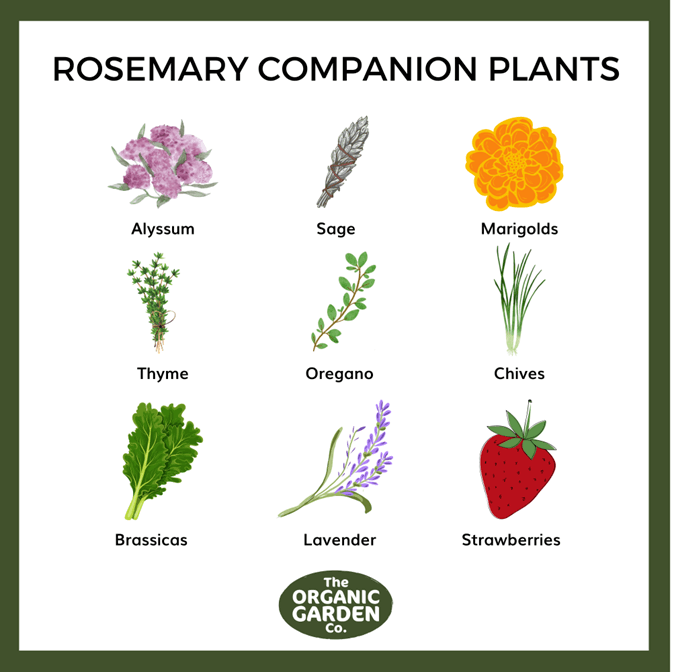
Rosemary is a popular companion plant to various herbs, fruits and vegetables. With insect-repellent qualities, rosemary companion plants include:
- Alyssum has tiny white flowers that attract pollinators and other beneficial insects, while rosemary repels pests like aphids.
- Sage can receive a healthy boost from being planted next to rosemary and often grow more flowers with rosemary nearby.
- Marigolds and rosemary have insect-repellent properties, making them ideal companions in any veggie patch.
- Thyme is a cabbage worm deterrent, and rosemary is an insect repellent. Planted together, rosemary and theme can protect your veggie garden from damaging pests.
- Oregano is a low-growing plant that spreads across the garden bed like a protective blanket over the soil. Meanwhile, rosemary grows taller than oregano, so it can capture all the sun it likes. It’s a match made in heaven!
- Chives are excellent companions with almost all herbs and vegetables. Like rosemary, chives repel pests with ease.
- Brassicas like cauliflower and cabbage attract cabbage moths, caterpillars and some butterflies. Rosemary has a strong aroma that covers the scent of brassicas, keeping pests away.
- Lavender and rosemary love warm climates and have almost identical care requirements. Plus, both plants attract pollinators like butterflies and bees.
- Strawberries react strongly to their companion plants, and rosemary is one of the best! Rosemary and strawberries can improve each other’s fertility, and rosemary protects vulnerable strawberries from pests.
Plants to avoid
Of course, with every companion plant comes an enemy plant!
- Mint and rosemary should be planted as far away from each other as possible. Mint is very overpowering and can take up a lot of space in your herb garden, leading the two herbs to compete.
- Pumpkins are prone to mildew and can cause root rot in rosemary.
- Tomatoes and rosemary can thrive in similar climates, but tomatoes need significantly more water to grow. Plus, rosemary can steal the necessary nutrients in the soil that tomatoes need to grow.
- Cucumbers don’t pair well with aromatic plants and herbs like rosemary. Plus, cucumbers need a lot of water to survive, so if rosemary is planted nearby, it’s likely to drown.
- Basil likes lots of time in the sun, just like rosemary — however, basil also likes damp soil and moisture. Rosemary prefers dry soil and weekly watering, so it would not survive long next to basil.
Sage companion plants
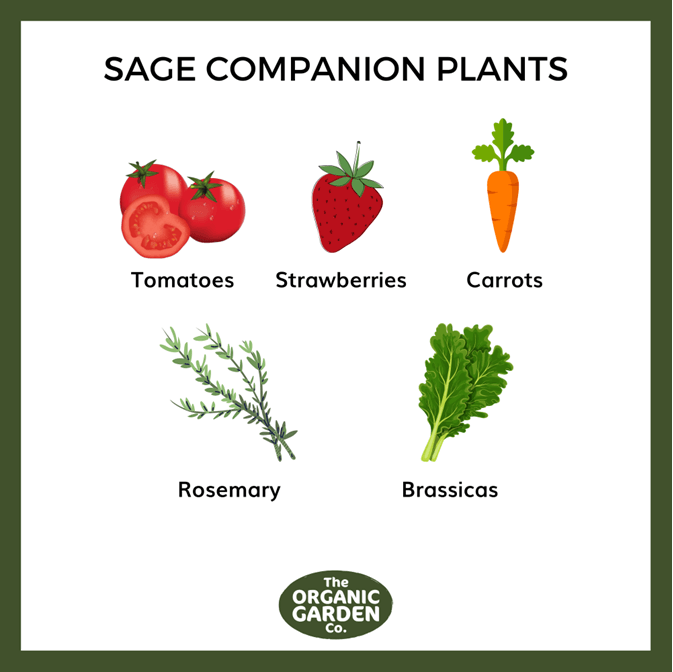
You should never overlook sage when starting a veggie patch. Sage is a natural growth stimulator and form of pest control and can even attract pollinators like butterflies and bees. Plus, there are loads of sage companion plants to choose from.
- Tomatoes benefit from being planted alongside sage, as sage naturally repels flea beetles and spider mites. Pairing sage with dill and coriander is also recommended to keep spider mites at bay.
- Strawberries taste much better when grown alongside sage. Plus, sage can easily keep away the pests that love to attack strawberry bushes.
- Carrots can also benefit from sage as a companion plant, as sage repels carrot rust flies.
- Rosemary doesn’t have a lot of companion plants, but sage and rosemary grow well together for an aromatic garden.
- Brassicas like broccoli, cauliflower, Brussels sprouts and kale love sage, as it repels cabbage moths, maggots, loopers, worms and black flea beetles.
Plants to avoid
While sage is an excellent pest repellent, we recommend avoiding a few plants like cucumbers, fennel and wormwood.
- Cucumbers should be paired with catnip, chives, dill, marigolds and radishes, all of which deter cucumber beetles and bugs. Sage can actually stunt cucumbers’ growth!
- Alliums like onions, garlic, shallots and chives prefer moist soil, which doesn’t work with sage. Instead, opt for gentler companion plants like chamomile.
- Rue should be kept away from sage, cabbage and basil, as rue stunts the growth of these plants.
- Wormwood controls whiteflies but harms sage.
- Fennel can stunt the growth of sage or cause it to flower too early in the season.
Thyme companion plants
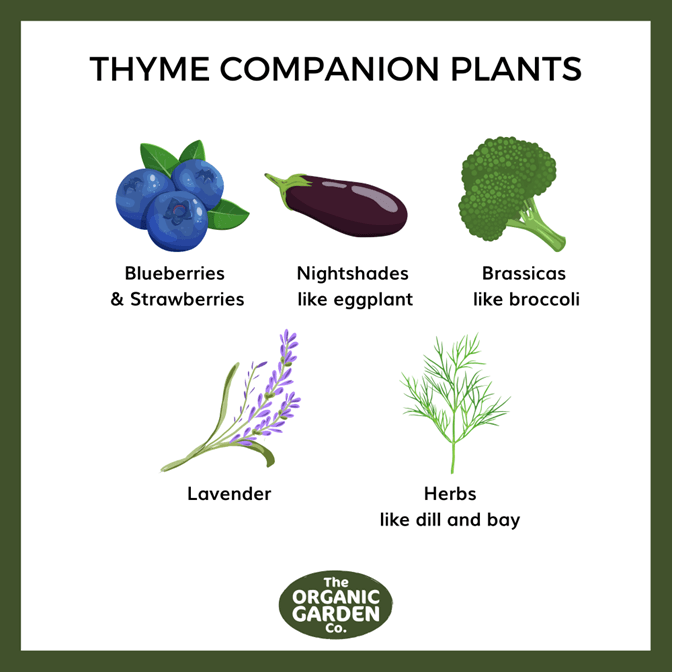
Thyme likes mostly dry and drought-tolerant soil, so you need to look for thyme companion plants that like the same harsh growing conditions.
- Blueberries and strawberries are protected by thyme, as thyme can help smother weeds, provide cover for the soil and deter worms from eating the fruit.
- Nightshades like eggplants, tomatoes and potatoes all love to be grown alongside thyme, as it is a natural deterrent for garden moths. Potatoes also flourish in dryer soil, just like thyme.
- Brassicas can benefit from the protection of thyme, as it repels pests and lures ladybugs — the natural predator of aphids.
- Lavender can help thyme flourish and grow and attracts beneficial insects like butterflies, ladybugs and bees.
- Herbs like dill, bay, fennel, parsley, rosemary and sage can all help thyme grow more effectively.
Plants to avoid
Thyme grows well with many other plants, but you should avoid partnering thyme with basil, coriander and chives. These herbs like moist soil rather than the dry conditions in which thyme flourishes.
Oregano companion plants
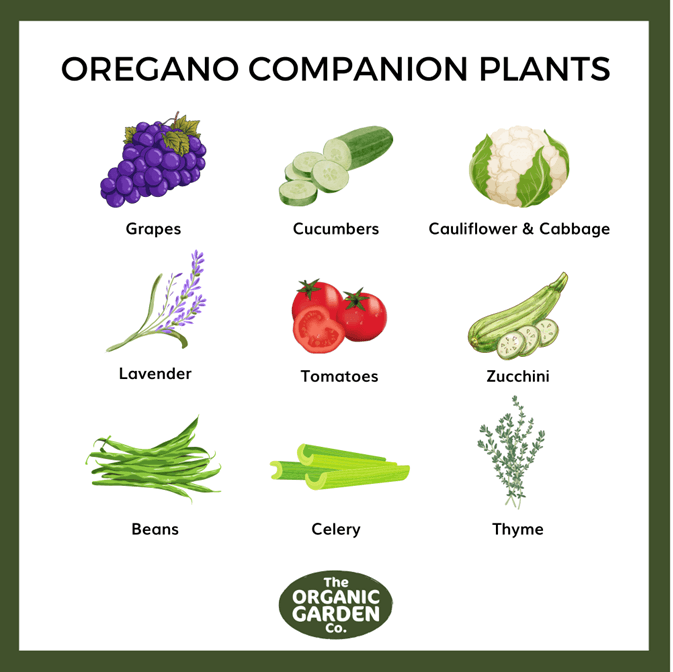
There are many oregano companion plants out there, but it’s important to remember that oregano doesn’t love moist soil — it prefers dry soil, just like thyme.
- Grapes are targeted by many backyard pests, but oregano naturally repels them.
- Cucumbers are an excellent oregano companion plant because oregano repels cucumber beetles.
- Cauliflower and cabbage can also benefit from oregano thanks to its pest-repelling qualities. Cabbage moths hate oregano!
- Lavender and thyme have the same soil requirements, allowing them to grow well together.
- Tomatoes benefit from oregano, especially once oregano starts to flower. Pollinators are attracted to oregano flowers and will lure butterflies, bees and ladybugs to your tomato plant.
- Zucchini and squash are protected by oregano — a natural repellant of squash bugs.
- Beans are very susceptible to aphids, which is why oregano is a recommended companion plant. Oregano attracts ladybugs that will eat the aphids.
- Celery grows well with oregano, as nasturtiums have a strong scent that repels flea beetles.
- Thyme and oregano encourage each other to flourish and grow. They also have the same planting requirements and prefer dry soil.
Plants to avoid
Basil, chives, coriander and mint all prefer moist soil — moister than what oregano plants need. If you plan to grow all these herbs, plant them in separate garden beds or containers.
Chives companion plants
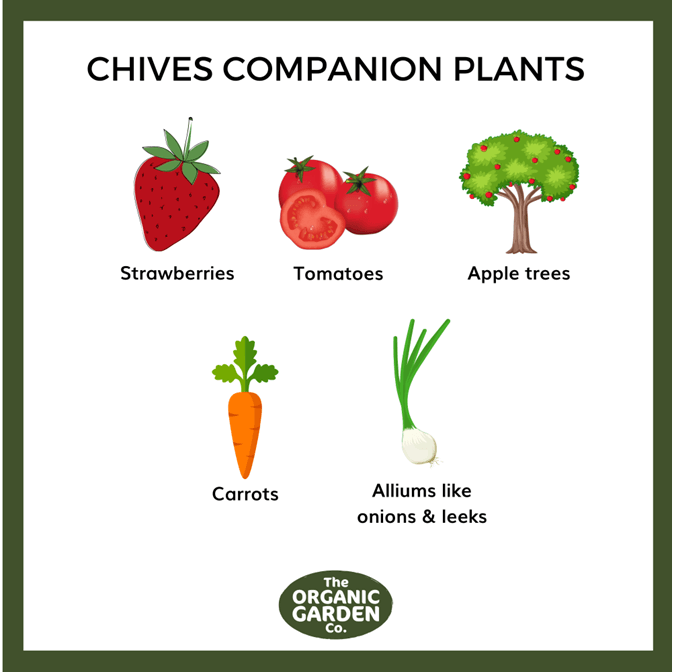
Chives are low-maintenance perennials and make good companion plants for others thanks to their long lifespan. Here are some examples of beneficial chive companion plants.
- Strawberries can feed on the nutrients that chives add to the soil, and you can use chive clippings as mulch for your berries.
- Tomatoes are often targeted by aphids, but chives naturally repel aphids and attract ladybugs.
- Apple trees benefit from chives because it repels apple scabs. It can also keep animals away that might want to eat the growing fruit.
- Carrots grow better alongside chives, giving you bigger bunches of carrots with a more intense flavour.
- Alliums like onions and leeks are directly related to chives, requiring a similar (if not the same) level of care.
Plants to avoid
Chives (and all members of the allium family) can stunt the growth of asparagus and prefer different growing conditions to herbs and flowers like oregano, sage, thyme, rosemary and lavender. These plants prefer sandy soil, which doesn’t sit well with chives.
Chamomile companion plants
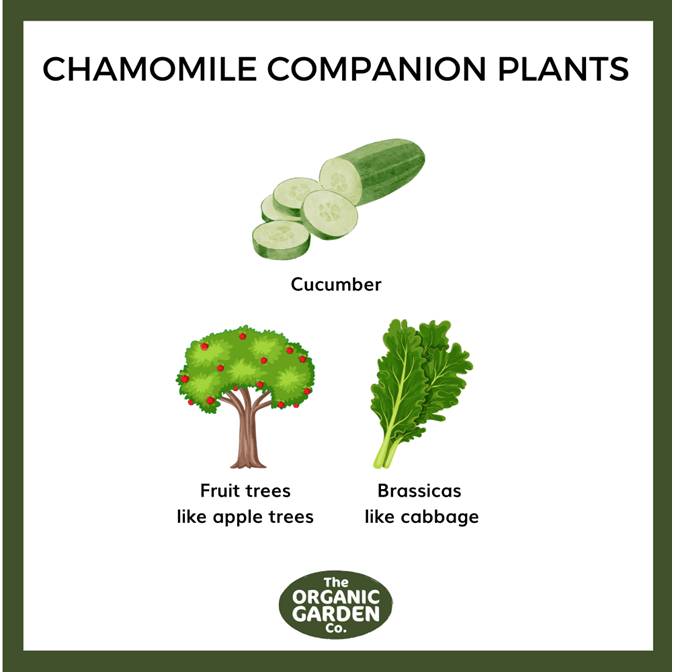
Chamomile requires full sun (or partial shade in hot climates), and the soil around it must always be moist — it’s a very finicky herb to grow, so you must be careful choosing chamomile companion plants!
- Cucumber is often the target of moisture-sucking pests. Chamomile’s scent can attract beneficial insects like ladybugs and hoverflies to eat these pests.
- Fruit trees benefit from chamomile’s antibacterial and antifungal properties. We recommend planting chamomile near fruit trees like apple trees to prevent fungal infections.
- Brassicas like cabbage and broccoli are vulnerable to pests like cabbage moths, butterflies, and cabbage worms. Chamomile has a strong scent that masks the aroma that attracts these pests.
Plants to avoid
While mint tends to grow well with most other flowers and herbs, chamomile is the exception. Chamomile can prevent mint plants from producing the oil that gives them their fragrance. Carrots, parsley and parsnips also attract pests that target chamomile, so we recommend keeping them far away from chamomile.
Fennel companion plants
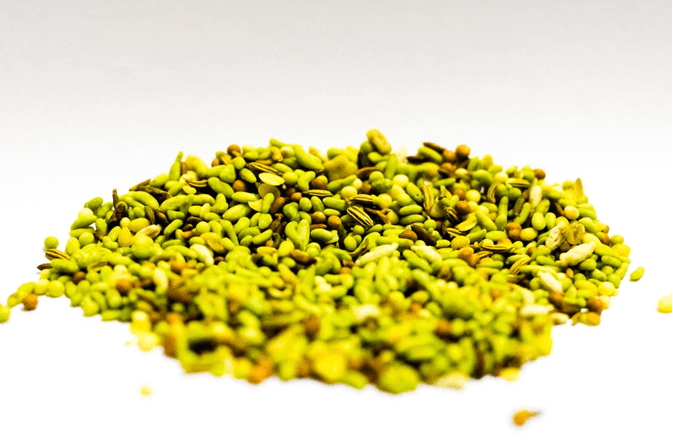
Fennel is an allelopathic plant — meaning it actually inhibits the growth or kills other garden plants! Dill is the only fennel companion plant because it offers a stabilising effect for fennel seeds, and fennel can deter the pests that like to feed on dill.
See your herbs flourish with a raised garden bed from Organic Garden Co!
At Organic Garden Co, we aim to make growing herbs, fruits, veggies and flowers easy in your backyard, which is why we offer raised garden beds that are not only affordable but super easy to use!
Browse through our collection of raised garden beds in various different colours, shapes and sizes — we can guarantee we’ve got something that will complement your landscaping to a tee!









